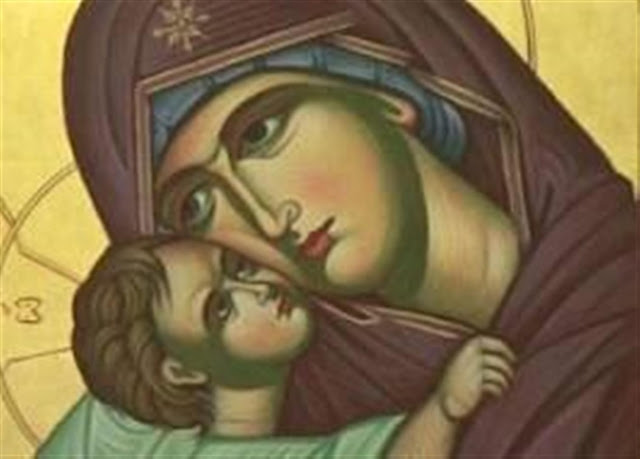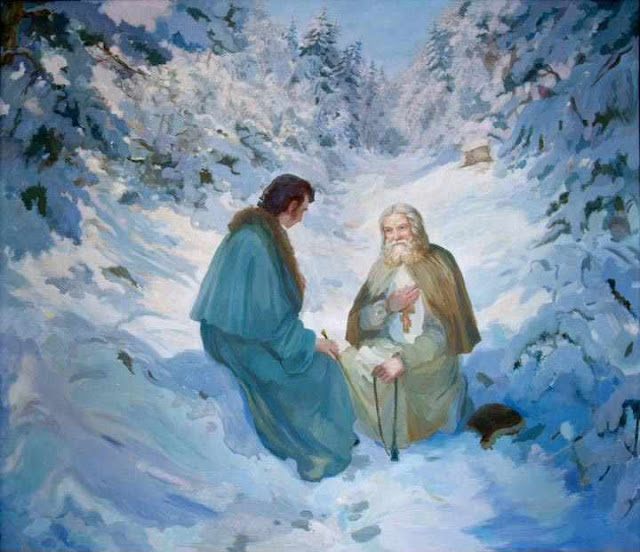Jesus Christ, the Lord and God of all, to Whom every creature and all of creation submit, remained obedient to His parents. This is truly remarkable!
But if we carefully consider the persons whom He obeyed, the duration of His submission, and the extent of His obedience, we will stand awestruck before the unsurpassed and unparalleled obedience displayed by Christ.
The Lord’s obedience was extraordinary, firstly, on account of the people to whom He submitted Himself. Indeed, it would have sufficed if the
Lord obeyed only His Most-holy mother; for she was His biological mother who conceived Him from her immaculate flesh, who carried Him for nine entire months in her womb, and who later nurtured Him with her milk.
Consequently, He had a mandatory obligation to obey her, not only because He was her genuine and true Son, but also because He was the Law-giver Himself Who had commanded the following:
“Honor your father and mother that it may be well with you, and your days may be long upon the good land” (Ex. 20:12); “Hear my son, the instruction of your father, and do not reject the laws of your mother” (Pr. 1:9); “He who honors his father atones for his sins; and he who honors his mother is like one who stores up treasure. He who honors his father will be gladdened by his own children, and when he prayed, he will be heard. He who honors his father will have a long life, and he who obeys the Lord will give rest to his mother; and he will serve his parents as his masters.
Honor your father and mother in word and deed, that a blessing may come upon you from him” (Sir. 3:6).
The Lord, however, chose to be obedient even to Righteous Joseph, despite the fact that He was neither required nor obligated to do so. Joseph was not Christ’s true, biological father; the Lord Jesus was not Joseph’s genuine, natural son. Joseph’s fatherhood and Christ’s sonship were both a portrayal, not an actuality. Their father-son relationship was assumed to be and referred to as true kinship, but in essence it was not real.
Despite this, the Lord desiring to display an extraordinary level of obedience submitted Himself indiscriminately and listened not only to His true mother but also to His supposed father Joseph, as if he was His real father. This is why St. Luke the Evangelist stated :
“Then He went down with them and came to Nazareth, and subjected Himself to them” (Lk. 2:51).
http://www.stnektariosmonastery.org/
But if we carefully consider the persons whom He obeyed, the duration of His submission, and the extent of His obedience, we will stand awestruck before the unsurpassed and unparalleled obedience displayed by Christ.
The Lord’s obedience was extraordinary, firstly, on account of the people to whom He submitted Himself. Indeed, it would have sufficed if the
Lord obeyed only His Most-holy mother; for she was His biological mother who conceived Him from her immaculate flesh, who carried Him for nine entire months in her womb, and who later nurtured Him with her milk.
Consequently, He had a mandatory obligation to obey her, not only because He was her genuine and true Son, but also because He was the Law-giver Himself Who had commanded the following:
“Honor your father and mother that it may be well with you, and your days may be long upon the good land” (Ex. 20:12); “Hear my son, the instruction of your father, and do not reject the laws of your mother” (Pr. 1:9); “He who honors his father atones for his sins; and he who honors his mother is like one who stores up treasure. He who honors his father will be gladdened by his own children, and when he prayed, he will be heard. He who honors his father will have a long life, and he who obeys the Lord will give rest to his mother; and he will serve his parents as his masters.
Honor your father and mother in word and deed, that a blessing may come upon you from him” (Sir. 3:6).
The Lord, however, chose to be obedient even to Righteous Joseph, despite the fact that He was neither required nor obligated to do so. Joseph was not Christ’s true, biological father; the Lord Jesus was not Joseph’s genuine, natural son. Joseph’s fatherhood and Christ’s sonship were both a portrayal, not an actuality. Their father-son relationship was assumed to be and referred to as true kinship, but in essence it was not real.
Despite this, the Lord desiring to display an extraordinary level of obedience submitted Himself indiscriminately and listened not only to His true mother but also to His supposed father Joseph, as if he was His real father. This is why St. Luke the Evangelist stated :
“Then He went down with them and came to Nazareth, and subjected Himself to them” (Lk. 2:51).
http://www.stnektariosmonastery.org/














